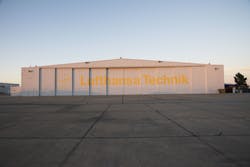Lufthansa Technik Component Services Increases U.S. Footprint
Late last year Lufthansa Technik Component Services (LTCS) completed a major expansion project at its Tulsa, OK, facility. The new component shop now provides 115,000 square feet, doubling the size of the North American headquarters. AMT talks with Stephen Fondell, managing director of Lufthansa Technik Component Services in Tulsa, and Wolfgang Reinert, head of external communications for Lufthansa Technik AG in Hamburg, Germany, about the expansion.
“We embarked on a program about four years ago to grow the component division and one of the main topics was to expand our production capabilities and footprint in North America,” Fondell says. “The new shops and additional hangar more than doubled our production work space. And, we added some new technologies.” These include high flow pneumatics and avionics. LTCS added its fourth ATEC (Series 6 automatic avionics test bench).
Lufthansa has also recently announced expansion in Florida with a distribution warehouse in Fort Lauderdale and a sales office in Miami.
Why Tulsa?
Lufthansa Technik has a long history in Tulsa going back to about 1998 when it opened a corporate sales office, Fondell says. That led to the acquisition of Bizjet and a composite business, although the composite business is no longer in operation. “We still do own Bizjet and it is being converted now from what was a completion center to primarily engine services,” he says. “Because we had that presence in Tulsa, and we had available space we started an avionics shop here in 2007. And then in 2012, we moved all component work from the region to Tulsa.
“We invest in Tulsa because the area is very much focused on aerospace.”
Oklahoma is also home to Tinker Air Force Base in Oklahoma City, employing more than 26,000 aircraft professionals. American Airlines’ MRO center is located in Tulsa with more than 6,000 aerospace workers. According to a report released last year, the Tulsa International Airport and surrounding aviation and aerospace businesses generate an annual economic impact of $11.7 billion.
Attracting Qualified Workforce
Technical colleges in the area such as Spartan College of Aeronautics and Technology and Tulsa Tech help provide the needed technicians. “As aerospace is the second most prominent industry in Oklahoma behind oil and gas, there are quite a few engineers from the University of Tulsa, Oklahoma State, and Oklahoma University,” Fondell states. “It makes for an environment that we can support our manpower requirements.”
LTCS has been regularly attending job fairs at the universities to attract talent. It offers internships to engineering students, for example. Several of them have ended up working for the company. It also has an apprenticeship program partnering with Tulsa Tech and Tulsa Community College. “We have a good reputation in Tulsa as a good employer and that's helped to attract talent,” Fondell says.
In addition, LTCS recognizes that the downturn in oil and gas has provided some manpower, which maybe wouldn't have been available otherwise.
Industry Growth
In 2017 LTCS did about 28,000 shop load events, and it has around 150 technicians in Tulsa. “We anticipate that we will continue growing, and we want to more than triple our output over time and would definitely see a buildup in personnel,” Fondell says. “What level that will be in the future will depend on the technologies and the shop load events that we're able to achieve.”
Lufthansa Technik has a lot of power by the hour contracts with customers in the Americas and the foundation of the component services was to enable production in the region. “As that business continues to grow substantially, we see induction coming from our power by the hour contracts. But, by expanding the Tulsa platform we want to also win business in the large closed loop market of the Americas," Fondell says.
The Lufthansa Technik production platform in Hamburg is still growing, Fondell says. “We focus on building up newer technologies like A350 and B787 in Hamburg and we're focused here on the aircraft that are prevalent in the region; A320 and B737 primarily with some regional capability and some other part numbers for other aircraft types.
“Every time we build up technology it requires that we're ready for it by having access to material, IP and the market supports it. So, it's kind of a complex chain of events that allows us to build up the technology. And because LTCS grew organically, it has implemented the company’s best practices and has had a lot of support from its colleagues in Hamburg and also the APAC region. As part of the lean program architecture that has built up, Lufthansa Technik tries wherever possible to implement the same processes in all its facilities. “At the moment, we’re running a different enterprise resource planning (ERP), but we're in the process now to change over to the LHT operating system,” Fondell says.
“I would say that our growth in shop load events hasn't reached what we had hoped for initially, but this is not because of a failure of some kind,” he says. “I think the expansion project itself took a little longer to launch due to a variety of reasons, so the platform wasn't necessarily there to reach the growth that we intended. That said, we still in 2017 over 2016 increased the shop load events by 25 percent. So, it's a substantial growth and we look for a figure also in the 20 percent range in 2018.
“Overall I would say that the component division in the Americas is growing substantially faster than the market,” Fondell says. “That was our target and we continue to do that.”
The growth in the Americas is not exclusive to the component division. “In the last couple of years, we’ve increased our sales footprint with the office in Miami, built up base maintenance in Puerto Rico (See Break Ground for Aviation, AMT January/February 2015, http://www.aviationpros.com/article/12030315), and added to our engine capability in Tulsa as well.”
“That's of course part of the strategy especially in the regions,” says Wolfgang Reinert. “The U.S. market and the Asian market are growing the most in aviation and that's also following our business. That's where we, in our position as one of the international market leaders, would like to be to plant our footprint and it's also the target in all the other areas of what we are offering: Just to grow with the market and to be on top of the technical evolution.”


